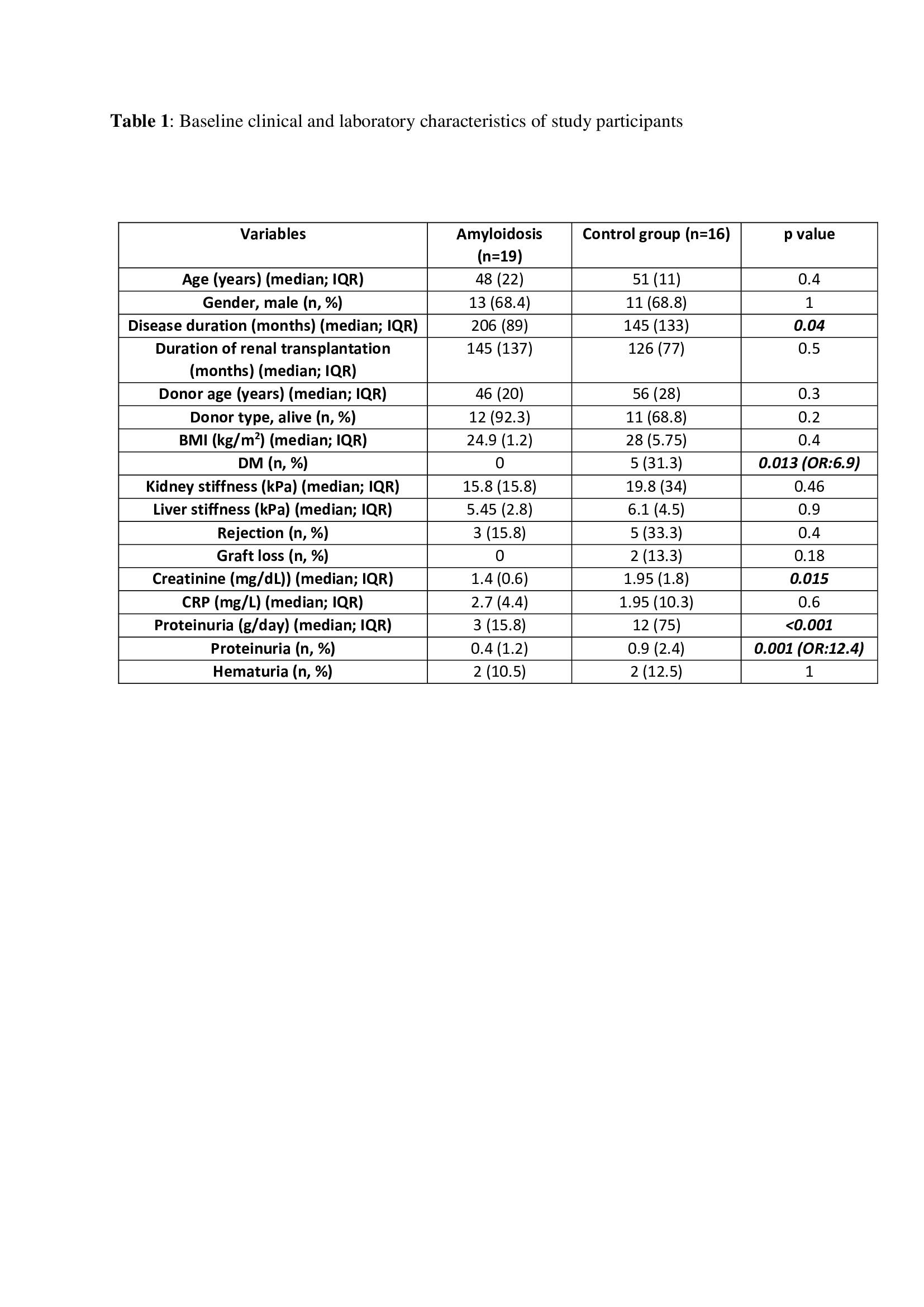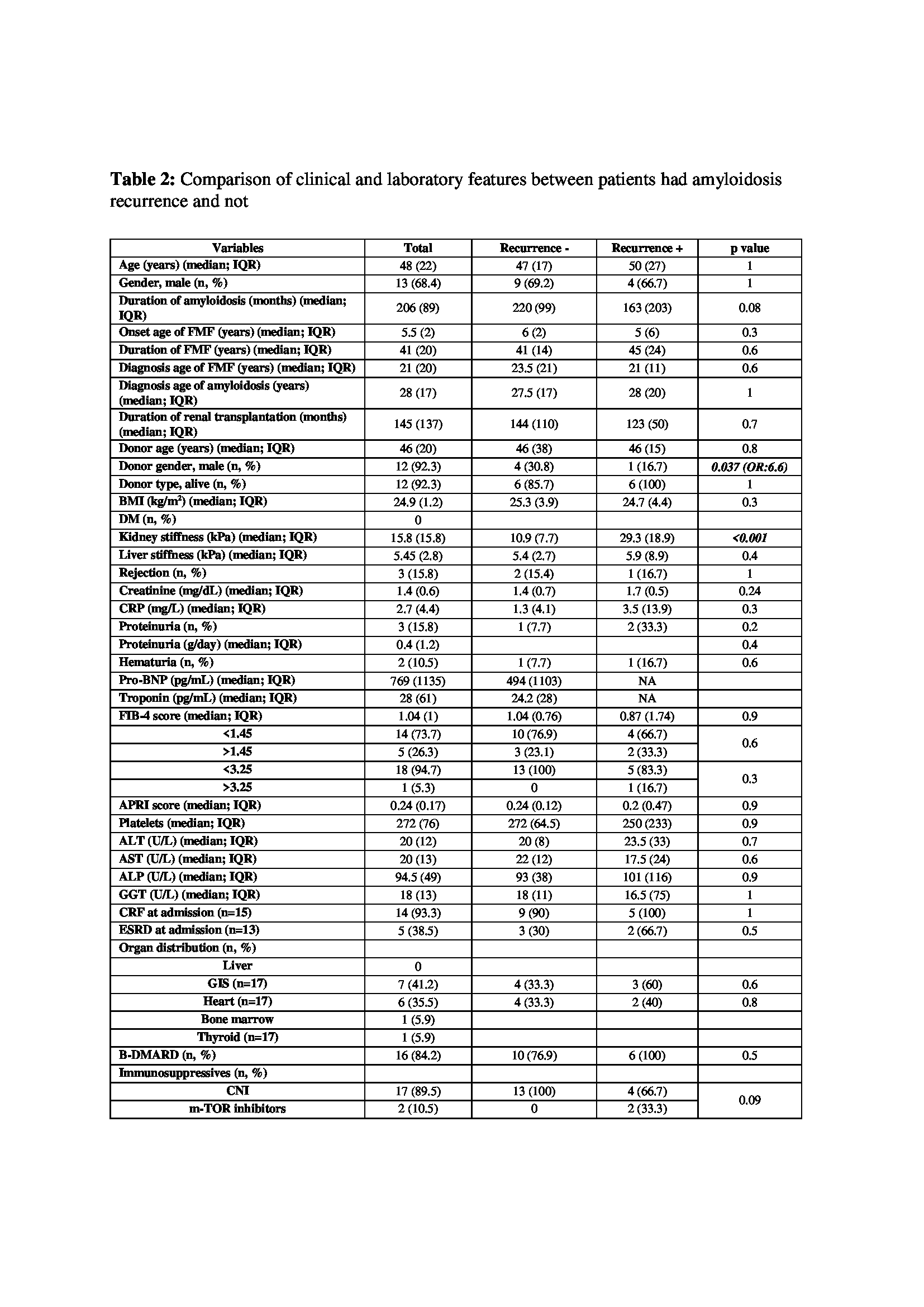Session Information
Date: Monday, November 8, 2021
Session Type: Poster Session C
Session Time: 8:30AM-10:30AM
Background/Purpose: Amyloidosis is characterized by accumulation of insoluble fibrils composed of different monomers in extracellular spaces of different organs, and demonstration of deposits by non-invasive methods is important especially for organs difficult to sample. Transient elastography (Fibroscan) is a diagnostic method of measuring liver stiffness (LS) being used in chronic liver diseases.
We herein aimed to search potential of fibroscan detecting kidney stiffness (KS) associated with amyloid deposition in patients with AA who received kidney transplants.
Methods: Renal transplant recipients (RTR) because of AA amyloidosis-related kidney failure (amyloidosis group; AG) and RTR due to other underlying diseases (control group; CG) enrolled into this study. KS and LS were measured by the same physician blinded to diagnosis. The stiffness results were expressed in kilopascals (kPa). Local ethics committee approval and patient consents were obtained.
Results: Nineteen AG and 16 CG patients included into the study. Baseline clinical and laboratory characteristics of participants are summarized in Table 1. Patient age, gender, body mass index (BMI), donor type, donor gender and donor age, frequency of rejection history and graft loss did not show significant difference between two groups. Frequency of diabetes mellitus (DM), median creatinine and proteinuria, median LS scores were higher in AG group than CG. Although median KS was higher in CG group, the difference was not significant. Baseline clinical and laboratory features were similar in AG patients with recurrent-amyloidosis (n=6) and non-recurrent AG patients (n=13) (Table 2). Median KS score was higher in recurrent compared to non-recurrent AG patients (p< 0.001). However median LS did not differ between two groups (p=0.4). In multivariate analysis only KS was associated with renal recurrence of AA (p=0.031; OR=1.18, 95% CI 1.015-1.362). In ROC analysis, a cut-off value of 24.55 kPa provided 83.3% sensitivity and 92.3% specificity (LR=10.8, AUC=0.936, p=0.003). Median KS was higher in patients with a history of rejection both among the patients with AG and CG, but the difference was not significant. Additionally, LS scores were similar between two groups.
In FMF-associated AA, median KS was higher in patients with one MEFV variant compared to those with two variants and tended to be higher in other MEFV variants compared to M694V homozygotes (p=0.027 and p=0.08, respectively). There was no correlation between the patient age, disease duration, duration of renal transplantation, donor age, BMI, LS, creatinine, CRP, proteinuria, and KS both in patients with AG and CG.
Conclusion: Median KS scores were similar between AG and CG groups; however it was higher in AG patients with recurrent kidney amyloidosis than those without recurrent disease, which may support using the fibroscan method as a useful screening method for establishing AA recurrence. Additionally, higher KS scores in patients with one MEFV variant compared to those with two variants need further studies to be able to identify other yet unidentified amyloidogenic factors.
 IQR: Interquartile range, BMI: Body mass index, DM: Diabetes mellitus, kPa: kilopascal
IQR: Interquartile range, BMI: Body mass index, DM: Diabetes mellitus, kPa: kilopascal
 Yeni-Microsoft-Word-Belgesi-_4_.jpeg”IQR: Interquartile range, FMF: Familial Mediterranean Fever, BMI: Body mass index, DM: Diabetes mellitus, kPa: kilopascal, CRF: Chronic renal failure, ESRD: End stage renal disease, GIS: Gastrointestinal system, b-DMARD: Biological disease modifying antirheumatic drug, CNI: Calcineurin inhibitors
Yeni-Microsoft-Word-Belgesi-_4_.jpeg”IQR: Interquartile range, FMF: Familial Mediterranean Fever, BMI: Body mass index, DM: Diabetes mellitus, kPa: kilopascal, CRF: Chronic renal failure, ESRD: End stage renal disease, GIS: Gastrointestinal system, b-DMARD: Biological disease modifying antirheumatic drug, CNI: Calcineurin inhibitors
To cite this abstract in AMA style:
Bektaş M, Çavuş B, Dirim A, Sari S, Şenkal V, Koca N, Ince B, Agargun B, Yalcinkaya Y, Esen B, İnanç M, Yazıcı H, Beşışık F, Gül A. Transient Elastography (Fibroscan) as a Non-Invasive Method for Detecting Amyloid Deposition in Transplanted Kidneys in Patients with AA Amyloidosis [abstract]. Arthritis Rheumatol. 2021; 73 (suppl 9). https://acrabstracts.org/abstract/transient-elastography-fibroscan-as-a-non-invasive-method-for-detecting-amyloid-deposition-in-transplanted-kidneys-in-patients-with-aa-amyloidosis/. Accessed .« Back to ACR Convergence 2021
ACR Meeting Abstracts - https://acrabstracts.org/abstract/transient-elastography-fibroscan-as-a-non-invasive-method-for-detecting-amyloid-deposition-in-transplanted-kidneys-in-patients-with-aa-amyloidosis/
